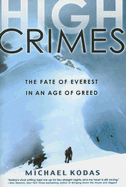

A journalist for the Hartford Courant, Kodas covered his own disastrous Everest expedition in the paper in 2004. Among the other climbers on the mountain at that time were Nils Antezana, a 69-year-old doctor, and his guide, Gustavo Lisi, whose stories Kodas juxtaposes here with his own. As relations among his team members deteriorated before they even arrived in the Himalaya, Kodas discovered that thievery, prostitution, violence and graft are in abundance on Everest--and all that just in Base Camp. Farther up the mountain, where human decency seems to have taken permanent leave, things get worse. On slopes littered with frozen bodies, unscrupulous guides abandon their well-paying but inexperienced clients; Sherpas extort money for survival, and oxygen tanks, food and equipment are regularly stolen from the high camps. In a particularly chilling aside, Kodas describes how one supplier sells tanks filled with damp oxygen that will freeze at higher altitudes, rendering them fatally useless.
Kodas assigns a large part of the blame for this miserable state of affairs to a lethal combination of ego and ready cash. In the quest to add Mt. Everest to their "bucket lists," rich adventurers seek to go straight to the top whether or not they've had sufficient training, and there is no shortage of opportunists willing to profit from that desire. Certainly Gustavo Lisi, who left his client to perish in Everest's "death zone," then later stole the dead man's equipment, fits the latter mold. But in a tale full of villains, Lisi gets stiff competition from George Dijmarescu, the leader of Kodas's expedition, a wife-beating thug who threatened to harm Kodas in one of his many murderous rages. Yet Kodas is quick to point out that the few arguably "good" guys in his harrowing story must also share responsibility for the fate of Everest. Antezana foresaw trouble with his guide but pressed on regardless. Kodas himself admits to contracting "summit fever," a judgment-obscuring condition.
Why risk so much--morally and physically--to stand on the summit of Everest? Despite its ubiquity, "because it's there" hardly seems to address the question. Kodas suggests that the answer may have a great deal to do with unchecked avarice and that oldest of human flaws: hubris.--Debra Ginsberg

